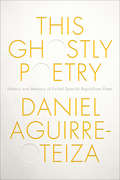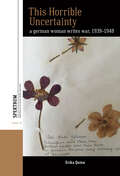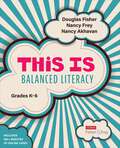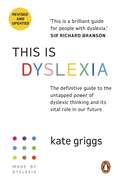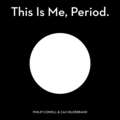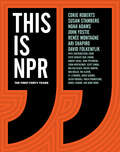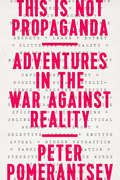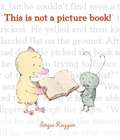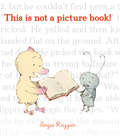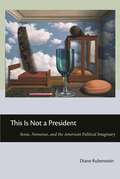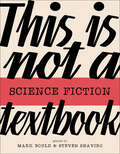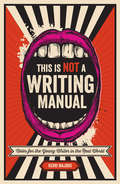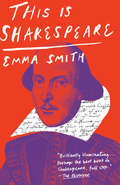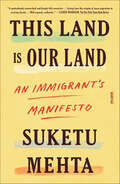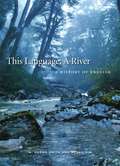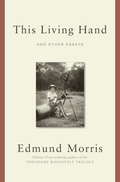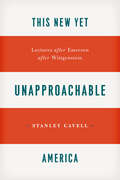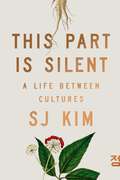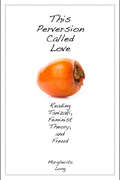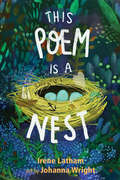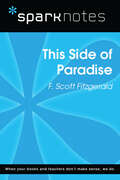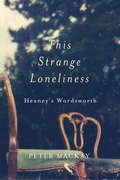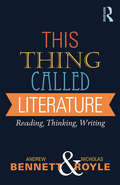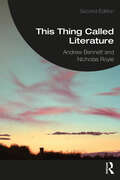- Table View
- List View
This Ghostly Poetry: Reading Spanish Republican Exiles between Literary History and Poetic Memory (Toronto Iberic)
by Daniel Aguirre-OteziaThe Spanish Civil War was idealized as a poet’s war. The thousands of poems written about the conflict are memorable evidence of poetry’s high cultural and political value in those historical conditions. After Franco’s victory and the repression that followed, numerous Republican exiles relied on the symbolic agency of poetry to uphold a sense of national identity. Exilic poems are often read as claim-making narratives that fit national literary history. This Ghostly Poetry critiques this conventional understanding of literary history by arguing that exilic poems invite readers to seek continuity with a traumatic past just as they prevent their narrative articulation. The book uses the figure of the ghost to address temporal challenges to historical continuity brought about by memory, tracing the discordant, disruptive ways in which memory is interwoven with history in poems written in exile. Taking a novel approach to cultural memory, This Ghostly Poetry engages with literature, history, and politics while exploring issues of voice, time, representation, and disciplinarity.
This Horrible Uncertainty: A German Woman Writes War, 1939-1948 (Spektrum: Publications of the German Studies Association #32)
by Erika QuinnThrough the diaries and personal papers of a German woman, Vera Conrad, this book documents her wartime experiences and deepens our understanding of the complex experiences of trauma and grief that National Socialist supporters experienced. Building on scholarship about mourning and widowhood that largely focuses on state policies and public discourses, This Horrible Uncertainty provides an interpretive framework of people’s perceptions of events and their capacity to respond to them. Using a history of emotions approach, Erika Quinn establishes that keeping the diary allowed Conrad to develop different selves in response to her responsibilities, fear, and grief after her husband was declared missing in 1943.
This Is Balanced Literacy, Grades K-6 (Corwin Literacy)
by Douglas Fisher Nancy Frey Nancy AkhavanThis is Balanced Literacy: Grades K-6 Students learn to read and write best when their teachers balance literacy instruction. But how do you strike the right balance of skills and knowledge, reading and writing, small and whole group instruction, and direct and dialogic instruction, so that all students can learn to their maximum potential? The answer lies in the intentional design of learning activities, purposeful selection of instructional materials, evidence-based teaching methods, and in strategic groupings of students based on assessment data. Together, these create the perfect balance of high impact learning experiences that engage and excite learners. In this hands-on essential guide, best-selling authors Douglas Fisher, Nancy Frey, and Nancy Akhavan help you define that balance for your students, lighting the path to implementing balanced literacy in your classroom. Their plan empowers you to integrate evidence-based approaches that include: • Instructional materials comprised of both informational and narrative texts. • The best uses of instructional delivery modes, including direct and dialogic instruction. • Grouping patterns that work best to accomplish learning aims for different learners at different stages. • Instruction in foundational skills and meaning making, including oral language, phonemic awareness, phonics, fluency, vocabulary, comprehension, and writing. • Technology used as a tool for increasing learning of a specific literary process. All the tips and tools you need to realize the goal of balanced literacy learning are included, with classroom videos that show strategies in action. Tap your intuition, collaborate with your peers, and put the research-based strategies embedded in this roadmap to work in your classroom to implement or deepen a strong, successful balanced literacy program. Grow as a reading and writing teacher while leading your students to grow as readers and writers.
This Is Balanced Literacy, Grades K-6 (Corwin Literacy)
by Douglas Fisher Nancy Frey Nancy AkhavanThis is Balanced Literacy: Grades K-6 Students learn to read and write best when their teachers balance literacy instruction. But how do you strike the right balance of skills and knowledge, reading and writing, small and whole group instruction, and direct and dialogic instruction, so that all students can learn to their maximum potential? The answer lies in the intentional design of learning activities, purposeful selection of instructional materials, evidence-based teaching methods, and in strategic groupings of students based on assessment data. Together, these create the perfect balance of high impact learning experiences that engage and excite learners. In this hands-on essential guide, best-selling authors Douglas Fisher, Nancy Frey, and Nancy Akhavan help you define that balance for your students, lighting the path to implementing balanced literacy in your classroom. Their plan empowers you to integrate evidence-based approaches that include: • Instructional materials comprised of both informational and narrative texts. • The best uses of instructional delivery modes, including direct and dialogic instruction. • Grouping patterns that work best to accomplish learning aims for different learners at different stages. • Instruction in foundational skills and meaning making, including oral language, phonemic awareness, phonics, fluency, vocabulary, comprehension, and writing. • Technology used as a tool for increasing learning of a specific literary process. All the tips and tools you need to realize the goal of balanced literacy learning are included, with classroom videos that show strategies in action. Tap your intuition, collaborate with your peers, and put the research-based strategies embedded in this roadmap to work in your classroom to implement or deepen a strong, successful balanced literacy program. Grow as a reading and writing teacher while leading your students to grow as readers and writers.
This Is Dyslexia
by Kate GriggsThe future needs Dyslexic Thinking!British social entrepreneur, founder and CEO of charity Made By Dyslexia, Kate Griggs has been shifting the narrative on dyslexia and educating people on its strengths since 2004. Having been surrounded by an extraordinary 'smorgasbord of Dyslexic Thinking' her whole life, Griggs knows the superpower of dyslexia all too well.Revised and updated, with new research and a forward from Sir Richard Branson, This is Dyslexia covers everything you need to understand, value and support Dyslexic Thinking. From offering practical advice on how to support the dyslexics in your life to breaking down the 6 Dyslexic Thinking skills in adults, Griggs shares her knowledge in an easily digestible guide.This is Dyslexia redefines and reshapes what it means to be dyslexic. It explores how it has shaped our past and how harnessing its powers and strengths is vital to our future.
This Is Me, Period.: The Art, Pleasures, and Playfulness of Punctuation
by Caz Hildebrand Philip CowellThe elements of style like you've never seen them beforeExplore the personalities of the punctuation marks we use every day with this bold, typographic journey through grammar. Each chapter in This is Me, Period introduces one of the major pieces of punctuation and all of its idiosyncracies, including:The dashing em dash— So-called "quotation marks"The colon: and on and onThe shouty exclamation!The three dots of . . . (Don't forget the brackets)And even moreAs charming as it is educational, This is Me, Period helps you understand sentence structure in a novel way that keeps you turning the pages for more.
This Is NPR: The First Forty Years
by Noah Adams Cokie Roberts David Folkenflik Susan Stamberg Ari Shapiro John Ydstie Renée MontagneA celebration of National Public Radio “full of short histories from familiar names . . . [a] retrospective illustrating just how much they have given us” (Publishers Weekly).“Always put the listener first” has been NPR’s mantra since its inception in 1970, and the result is that its programming attracts tens of millions of listeners every week. This beautifully designed volume chronicles the first forty years of NPR’s storied history, featuring dozens of behind-the-scenes photos, essays, and original reporting by a who’s who of NPR staff and correspondents, and transcripts of memorable interviews. Beyond an entertaining and inspiring tribute to NPR’s remarkable history, this book is an intimate look at the news and stories that have shaped our world, from the people who were on the ground and on the air. With contributions from: Steve Inskeep * Neal Conan * Robert Siegel * Nina Totenberg * Linda Wertheimer * Scott Simon * Melissa Block * P.J. O’Rourke * David Sedaris * Sylvia Poggioli * Ira Flatow * Paula Poundstone * Daniel Schorr * and many more One of Cool Hunter’s Top Five Books of the Year
This Is Not Propaganda: Adventures in the War Against Reality
by Peter PomerantsevWhen information is a weapon, every opinion is an act of war.We live in a world of influence operations run amok, where dark ads, psyops, hacks, bots, soft facts, ISIS, Putin, trolls, and Trump seek to shape our very reality. In this surreal atmosphere created to disorient us and undermine our sense of truth, we've lost not only our grip on peace and democracy--but our very notion of what those words even mean.Peter Pomerantsev takes us to the front lines of the disinformation age, where he meets Twitter revolutionaries and pop-up populists, "behavioral change" salesmen, Jihadi fanboys, Identitarians, truth cops, and many others. Forty years after his dissident parents were pursued by the KGB, Pomerantsev finds the Kremlin re-emerging as a great propaganda power. His research takes him back to Russia--but the answers he finds there are not what he expected.
This Is Not a Picture Book!
by Sergio RuzzierIn this quirky yet sweet picture book about the joy and power of reading, Duck learns that even books without pictures can be fun. While he and his friend Bug may struggle at first to decipher their book, they stick with it, and before long they discover that not only can they read it, but it deserves a place on the shelf with all their favorite picture books. Author-artist Sergio Ruzzier has created a fanciful tribute to books of all kinds. It includes both words AND pictures.
This Is Not a Picture Book!
by Sergio RuzzierIn this quirky yet sweet picture book about the joy and power of reading, Duck learns that even books without pictures can be fun. While he and his friend Bug may struggle at first to decipher their book, they stick with it, and before long they discover that not only can they read it, but it deserves a place on the shelf with all their favorite picture books. Author-artist Sergio Ruzzier has created a fanciful tribute to books of all kinds. It includes both words AND pictures. And because this is the fixed-format version, it looks almost identical to the print edition!
This Is Not a President: Sense, Nonsense, and the American Political Imaginary
by Diane RubensteinRead The Chronicle of Higher Ed Author InterviewIn This Is Not a President, Diane Rubenstein looks at the postmodern presidency — from Reagan and George H. W. Bush, through the current administration, and including Hillary. Focusing on those seemingly inexplicable gaps or blind spots in recent American presidential politics, Rubenstein interrogates symptomatic moments in political rhetoric, popular culture, and presidential behavior to elucidate profound and disturbing changes in the American presidency and the way it embodies a national imaginary.In a series of essays written in real time over the past four presidential administrations, Rubenstein traces the vernacular use of the American presidency (as currency, as grist for popular biography, as fictional TV material) to explore the ways in which the American presidency functions as a “transitional object” that allows the American citizen to meet or discover the president while going about her everyday life. The book argues that it is French theory — primarily Lacanian psychoanalysis and the radical semiotic theories of Jean Baudrillard — that best accounts for American political life today. Through episodes as diverse as Iran Contra, George H. W. Bush vomiting in Japan, the 1992 Republican convention, the failed nomination of Lani Guinier, and the Iraq War, This Is Not a President brilliantly situates our collective investment in American political culture.
This Is Not a Science Fiction Textbook (This Is Not a...Textbook)
by Mark Bould Steven ShaviroScience fiction as a vital bridge between technoscience and culture, an early warning system, a method for imagining differently.In the new millennium, science fiction has moved from the margins to the mainstream. At the same time, it has undergone massive transformations. No longer can it be derided as indigestible technobabble or escapist trash or a white man&’s playground—not that it ever really was. Sf is rich and diverse, serious, and fun. A vital bridge between technoscience and culture, it is an early warning system, a method for imagining differently, and a way of experiencing our increasingly science-fictional world. It is the vernacular of the 21st century. This Is Not A Science Fiction Textbook brings together leading sf scholars, including some of the most exciting new critical voices, to introduce the genre for the general reader. Its first part outlines some key ideas used to think about sf, such as Estrangement, Extrapolation, and Alterity. Its second part maps some of the genre&’s global history, from the Enlightenment and European colonialism to Indigenous and African Futurisms. Its third part surveys sf at the turn of the 2020s, organised by concepts, movements and new academic disciplines, from Afrofuturism and Animal Studies to Queer Theory and the Weird—and each chapter, whether it is on Climate Fiction or Neurodiversity, is accompanied by an introduction to a major contemporary novel and film.
This Is Not a Writing Manual: Notes for the Young Writer in the Real World
by Kerri MajorsReal-world writing advice, minus all the lectures. You're an aspiring writer. Maybe you've just discovered your love of words and dream of being a novelist someday. Maybe you've been filling notebooks with science-fiction stories since middle school. Maybe you're contemplating a liberal arts degree, but you don't know what the heck you're going to do with it. The last thing you need is another preachy writing manual telling you how you should write. This book isn't a writing manual. It is a series of candid and irreverent essays on the writing life, from a writer who's lived it. Kerri Majors shares stories from her own life that offer insights on the realities all writers face: developing a writing voice, finding a real job (and yes, you do need to find one), taking criticism, getting published, and dealing with rejection. Don't have enough time to write? Learn how to plan your days to fit it all in. Not sure how your guilty pleasures and bad habits translate into literature? Kerri explains how soap operas and eavesdropping can actually help your writing. Need a reader for your first novel? Find a writing buddy or a writing group that will support you. Nervous about submitting your first piece? Learn from Kerri's own roller coaster journey to find an agent and get published. This Is Not a Writing Manual is the writing memoir for young writers who want to use their talents in the real world.
This Is Shakespeare
by Emma SmithAn electrifying new study that investigates the challenges of the Bard&’s inconsistencies and flaws, and focuses on revealing—not resolving—the ambiguities of the plays and their changing topicality A genius and prophet whose timeless works encapsulate the human condition like no other. A writer who surpassed his contemporaries in vision, originality, and literary mastery. A man who wrote like an angel, putting it all so much better than anyone else. Is this Shakespeare? Well, sort of. But it doesn&’t tell us the whole truth. So much of what we say about Shakespeare is either not true, or just not relevant. In This Is Shakespeare, Emma Smith—an intellectually, theatrically, and ethically exciting writer—takes us into a world of politicking and copycatting, as we watch Shakespeare emulating the blockbusters of Christopher Marlowe and Thomas Kyd (the Spielberg and Tarantino of their day), flirting with and skirting around the cutthroat issues of succession politics, religious upheaval, and technological change. Smith writes in strikingly modern ways about individual agency, privacy, politics, celebrity, and sex. Instead of offering the answers, the Shakespeare she reveals poses awkward questions, always inviting the reader to ponder ambiguities.
This Land Is Our Land: An Immigrant's Manifesto
by Suketu MehtaA 2019 NPR Staff Pick“Written ‘in sorrow and anger,’ this is a brilliant and urgently necessary book, eloquently making the case against bigotry and for all of us migrants—what we are not, who we are, and why we deserve to be welcomed, not feared.” —Salman RushdieA timely argument for why the United States and the West would benefit from accepting more immigrantsThere are few subjects in American life that prompt more discussion and controversy than immigration. But do we really understand it? In This Land Is Our Land, the renowned author Suketu Mehta attacks the issue head-on. Drawing on his own experience as an Indian-born teenager growing up in New York City and on years of reporting around the world, Mehta subjects the worldwide anti-immigrant backlash to withering scrutiny. As he explains, the West is being destroyed not by immigrants but by the fear of immigrants. Mehta juxtaposes the phony narratives of populist ideologues with the ordinary heroism of laborers, nannies, and others, from Dubai to Queens, and explains why more people are on the move today than ever before. As civil strife and climate change reshape large parts of the planet, it is little surprise that borders have become so porous. But Mehta also stresses the destructive legacies of colonialism and global inequality on large swaths of the world: When today’s immigrants are asked, “Why are you here?” they can justly respond, “We are here because you were there.” And now that they are here, as Mehta demonstrates, immigrants bring great benefits, enabling countries and communities to flourish. Impassioned, rigorous, and richly stocked with memorable stories and characters, This Land Is Our Land is a timely and necessary intervention, and a literary polemic of the highest order.
This Language, A River: A History of English
by K. Aaron Smith Susan M. KimThis Language, A River is an introduction to the history of English that recognizes multiple varieties of the language in both current and historical contexts. Developed over years of undergraduate teaching, the book helps students both to grasp traditional histories of English and to extend and complicate those histories. Exercises throughout provide opportunities for puzzling out concepts, committing terms and data to memory, and applying ideas. A comprehensive glossary and up-to-date bibliographies help to guide further study.
This Living Hand: And Other Essays
by Edmund MorrisWhen the multitalented biographer Edmund Morris (who writes with equal virtuosity about Theodore Roosevelt, Ronald Reagan, Beethoven, and Thomas Edison) was a schoolboy in colonial Kenya, one of his teachers told him, "You have the most precious gift of all--originality." That quality is abundantly evident in this selection of essays. They cover forty years in the life of a maverick intellectual who can be, at whim, astonishingly provocative, self-mockingly funny, and richly anecdotal. (The title essay, a tribute to Reagan in cognitive decline, is poignant in the extreme.) Whether Morris is analyzing images of Barack Obama or the prose style of President Clinton, or exploring the riches of the New York Public Library Dance Collection, or interviewing the novelist Nadine Gordimer, or proposing a hilarious "Diet for the Musically Obese," a continuous cross-fertilization is going on in his mind. It mixes the cultural pollens of Africa, Britain, and the United States, and propogates hybrid flowers--some fragrant, some strange, some a shock to conventional sensibilities. Repeatedly in This Living Hand, Morris celebrates the physicality of artistic labor, and laments the glass screen that today's e-devices interpose between inspiration and execution. No presidential biographer has ever had so literary a "take" on his subjects: he discerns powers of poetic perception even in the obsessively scientific Edison. Nor do most writers on music have the verbal facility to articulate, as Morris does, what it is about certain sounds that soothe the savage breast. His essay on the pathology of Beethoven's deafness breaks new ground in suggesting that tinnitus may explain some of the weird aural effects in that composer's works. Masterly monographs on the art of biography, South Africa in the last days of apartheid, the romance of the piano, and the role of imagination in nonfiction are juxtaposed with enchanting, almost unclassifiable pieces such as "The Bumstitch: Lament for a Forgotten Fruit" (Morris suspects it may have grown in the Garden of Eden); "The Anticapitalist Conspiracy: A Warning" (an assault on The Chicago Manual of Style); "Nuages Gris: Colors in Music, Literature, and Art"; and the uproarious "Which Way Does Sir Dress?", about ordering a suit from the most expensive tailor in London. Uniquely illustrated with images that the author describes as indispensable to his creative process, This Living Hand is packed with biographical insights into such famous personalities as Daniel Defoe, Henry Adams, Mark Twain, Evelyn Waugh, Truman Capote, Glenn Gould, Jasper Johns, W. G. Sebald, and Winnie the Pooh--not to mention a gallery of forgotten figures whom Morris lovingly restores to "life." Among these are the pianist Ferruccio Busoni, the poet Edwin Arlington Robinson, the novelist James Gould Cozzens, and sixteen so-called "Undistinguished Americans," contributors to an anthology of anonymous memoirs published in 1902. Reviewing that book for The New Yorker, Morris notes that even the most unlettered persons have, on occasion, "power to send forth surprise flashes, illuminating not only the dark around them but also more sophisticated shadows--for example, those cast by public figures who will not admit to private failings, or by philosophers too cerebral to state a plain truth." The author of This Living Hand is not an ordinary person, but he too sends forth surprise flashes, never more dazzlingly than in his final essay, "The Ivo Pogorelich of Presidential Biography."
This New Yet Unapproachable America: Lectures after Emerson after Wittgenstein (Frederick Ives Carpenter Lectures; Ser.)
by Stanley CavellStanley Cavell is a titan of the academic world; his work in aesthetics and philosophy has shaped both fields in the United States over the past forty years. In this brief yet enlightening collection of lectures, Cavell investigates the work of two of his most tried-and-true subjects: Emerson and Wittgenstein. Beginning with an introductory essay that places his own work in a philosophical and historical context, Cavell guides his reader through his thought process when composing and editing his lectures while making larger claims about the influence of institutions on philosophers, and the idea of progress within the discipline of philosophy. In “Declining Decline,” Cavell explains how language modifies human existence, looking specifically at the culture of Wittgenstein’s writings. He draws on Emerson, Thoreau, and many others to make his case that Wittgenstein can indeed be viewed as a “philosopher of culture.” In his final lecture, “Finding as Founding,” Cavell writes in response to Emerson’s “Experience,” and explores the tension between the philosopher and language—that he or she must embrace language as his or her “form of life,” while at the same time surpassing its restrictions. He compares finding new ideas to discovering a previously unknown land in an essay that unabashedly celebrates the power and joy of philosophical thought.
This Part Is Silent: A Life Between Cultures
by SJ KimA searing essay collection that explores displacement and loss, creativity and change, institutional power and progress. Born in Korea, raised in the American South, and trying her best to survive British academia, SJ Kim probes her experiences as a writer, a scholar, and a daughter to confront the silences she finds in the world. With curiosity and sensitivity, she writes letters to the institutions that simultaneously support and fail her, intimate accounts of immigration, and interrogations of rising anti-Black and anti-Asian racism. She considers the silences between generations—especially within the Asian diaspora in the West—as she finds her way back to her own family during the pandemic lockdown. Embracing the possibilities and impossibilities of language, Kim rejoices in the similes of Korean, her mother tongue, and draws inspiration from K-dramas and writers across cultures who sustain her. As borders close in and nations enter lockdown, the journey that Kim traces is fraught—and at once illuminates that the act of remaining present has its own power, allowing boundless hope.
This Perversion Called Love
by Margherita LongLong (comparative literature and foreign languages, U. of California, Riverside) considers sexual perversion in Tanizaki Jun'ichiro's aesthetic essays, cultural criticism, cinema writings, and short novels from the 1930s, intersections with psychoanalysis, and what this means from a feminist perspective. She contends that Tanizaki sees human subjectivity in the same way as Freud, but that he is more critical than Freud about the possibility of love, that such love is impossible in a monosexual perspective. Using a feminist approach, she provides a psychoanalytic look at the intellectual climate of 1930s Japan and Tanazaki's essays within this context; outlines parallels with Freud's ideas of masochism; analyzes Tanazaki's novels in terms of feminist ideas; and discusses his contribution to the feminist debate on maternity, and parallels to feminist film theory in his cinema essays, especially how in feminist film theory, cinema equates women with absence. Annotation c2010 Book News, Inc. , Portland, OR (booknews. com)
This Poem is a Nest
by Irene LathamA Kirkus Reviews Best BookAn NCTE Notable Poetry BookThis beautiful poetry collection introduces readers to the art of found poetry as the poet writes a 37-line poem, "Nest," then finds 160 smaller poems within it.What can you find in a poem about a robin's nest? Irene Latham masterfully discovers "nestlings" or smaller poems about an astonishing variety of subjects--emotions, wild animals, natural landmarks on all seven continents, even planets and constellations. Each poem is a glorious spark of wonder that will prompt readers to look at the world afresh. The book includes an introduction detailing the principles of found poetry and blackout poetry, and a section of tips at the end. The joyous creativity in this volume is certain to inspire budding poets.
This Side of Paradise (SparkNotes Literature Guide Series)
by SparkNotesThis Side of Paradise (SparkNotes Literature Guide) by F. Scott Fitzgerald Making the reading experience fun! Created by Harvard students for students everywhere, SparkNotes is a new breed of study guide: smarter, better, faster. Geared to what today's students need to know, SparkNotes provides: *Chapter-by-chapter analysis *Explanations of key themes, motifs, and symbols *A review quiz and essay topicsLively and accessible, these guides are perfect for late-night studying and writing papers
This Strange Loneliness: Heaney's Wordsworth
by Peter MackayThis Strange Loneliness is the first comprehensive account of the poetic relationship between Seamus Heaney and William Wordsworth. Peter Mackay explores how Heaney repeatedly turns to the Romantic poet's work for inspiration, corroboration, and amplification, and as a model for the fortifying power of poetry itself, which offers the fundamental lesson that "it is on this earth 'we find our happiness, or not at all.'"Through an in-depth look at archival materials, and at uncollected poems and prose by Heaney, Mackay traces the evolution of Heaney's readings of Wordsworth throughout his career, revealing their shared interest in the connections between poetry and education, the possibility of a beneficial understanding of poetic influence, the complexities of place and displacement, ideas of transcendence, and ultimately the importance of "late style": later poems by Wordsworth might prove a cautionary tale, as well as example, for any poet. Placing Heaney's readings within their political, historical, and poetic contexts the book also explores how he negotiated the complex relationship between Irish and British culture and identity to claim a persistent form of kinship, and forge a strange community, with the Romantic poet.With illuminating readings that reveal new contexts to and currents in Heaney's work, This Strange Loneliness is a powerful evocation of the Irish poet's sense of the "uplift" that poetry can provide.
This Thing Called Literature: Reading, Thinking, Writing
by Andrew Bennett Nicholas RoyleWhat is this thing called literature? Why should we study it? And how? Relating literature to topics such as dreams, politics, life, death, the ordinary and the uncanny, this beautifully written book establishes a sense of why and how literature is an exciting and rewarding subject to study. Bennett and Royle delicately weave an essential love of literature into an account of what literary texts do, how they work and what sort of questions and ideas they provoke. The book's three parts reflect the fundamental components of studying literature: reading, thinking and writing. The authors use helpful, familiar examples throughout, offering rich reflections on the question 'What is literature?' and on what they term 'creative reading'. Bennett and Royle's lucid and friendly style encourages a deep engagement with literary texts. This book is not only an essential guide to the study of literature, but an eloquent defence of the discipline.
This Thing Called Literature: Reading, Thinking, Writing
by Andrew Bennett Nicholas RoyleWhat is this thing called literature? Why study it? And how? Relating literature to topics such as dreams, politics, life, death, the ordinary and the uncanny, This Thing Called Literature establishes a sense of why and how literature is an exciting and rewarding subject to study. Andrew Bennett and Nicholas Royle expertly weave an essential love of literature into an account of what literary texts do, how they work and the sort of questions and ideas they provoke. The book’s three parts reflect the fundamental components of studying literature: reading, thinking and writing. The authors use helpful and wide-ranging examples and summaries, offering rich reflections on the question ‘What is literature?’ and on what they term ‘creative reading’. The new edition has been revised throughout with extensive updates to the further reading and a new chapter on creative non-fiction. Bennett and Royle’s accessible and thought-provoking style encourages a deep engagement with literary texts. This essential guide to the study of literature is an eloquent celebration of the value and pleasure of reading.
